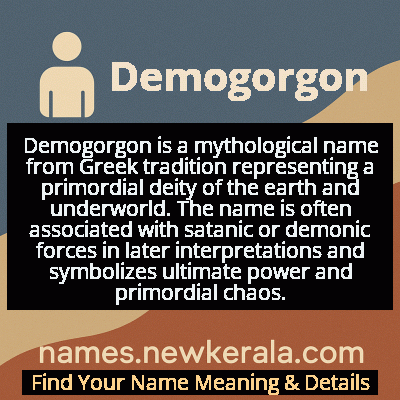Demogorgon Name Meaning & Details
Origin, Popularity, Numerology Analysis & Name Meaning of Demogorgon
Discover the origin, meaning, and cultural significance of the name DEMOGORGON. Delve into its historical roots and explore the lasting impact it has had on communities and traditions.
Name
Demogorgon
Gender
Male
Origin
Greek
Lucky Number
5
Meaning of the Name - Demogorgon
Demogorgon is a mythological name from Greek tradition representing a primordial deity of the earth and underworld. The name is often associated with satanic or demonic forces in later interpretations and symbolizes ultimate power and primordial chaos.
Demogorgon - Complete Numerology Analysis
Your Numerology Number
Based on Pythagorean Numerology System
Ruling Planet
Mercury
Positive Nature
Adventurous, dynamic, curious, and social.
Negative Traits
Restless, impatient, inconsistent, prone to indulgence.
Lucky Colours
Green, white.
Lucky Days
Wednesday.
Lucky Stones
Emerald.
Harmony Numbers
1, 3, 9.
Best Suited Professions
Sales, marketing, travel, entertainment.
What People Like About You
Versatility, charisma, adventurous spirit.
Famous People Named Demogorgon
Demogorgon
Mythological Figure
Primordial deity of Greek mythology and later Christian demonology
Demogorgon Character
Literary Figure
Powerful demonic entity in Renaissance literature and epic poetry
Demogorgon Monster
Fictional Creature
Terrifying interdimensional being in modern popular culture
Name Variations & International Equivalents
Click on blue names to explore their detailed meanings. Gray names with will be available soon.
Cultural & Historical Significance
During the Christian era, Demogorgon was assimilated into demonology as a satanic figure, often identified with Satan himself. This transformation reflects the broader cultural process of Christianizing pagan deities into demons. The name appears in numerous literary works, from Spenser's 'The Faerie Queene' to Shelley's 'Prometheus Unbound,' where it represents various aspects of primal power, chaos, and rebellion. In the 20th and 21st centuries, Demogorgon experienced a resurgence through fantasy literature and gaming, culminating in its iconic status in 'Stranger Things,' where it embodies contemporary fears of the unknown and interdimensional threats.
Extended Personality Analysis
The personality attributed to Demogorgon is drawn entirely from mythological and literary sources, as it is not used for human naming. In classical and Renaissance traditions, Demogorgon possesses traits of immense ancient wisdom, absolute power, and terrifying presence. The entity is typically depicted as reclusive, dwelling in deep caverns or the underworld, possessing knowledge of fate and destiny that makes even other deities apprehensive. This creates a personality profile of mysterious authority, where Demogorgon's very existence represents forces beyond comprehension or control.
In modern interpretations, particularly in horror and fantasy genres, Demogorgon's personality traits emphasize primal aggression, relentless pursuit, and alien intelligence. The creature is often portrayed as a predator driven by instinctual hunger or destructive impulses, representing the fear of nature's indifference and the violence inherent in existence. These traits combine to form a personality of pure antagonism - not evil in the human sense, but representing the chaotic, destructive aspects of the cosmos that threaten ordered reality. The figure serves as an embodiment of everything humanity fears in the unknown.
Modern Usage & Popularity
In contemporary contexts, Demogorgon is used almost exclusively as a fictional name rather than a personal given name. The character achieved mainstream recognition through the Netflix series 'Stranger Things,' where it serves as the primary monstrous antagonist from the parallel dimension called the Upside Down. This portrayal has made the name widely familiar in popular culture, though it remains extremely rare for actual naming due to its dark mythological associations. The name appears frequently in fantasy gaming, particularly in Dungeons & Dragons where Demogorgon is a major demon prince, and in various video games and fantasy novels as a powerful antagonist. Its modern usage reflects ongoing fascination with mythological horror and ancient concepts of evil, though it's generally avoided for human naming due to its strong demonic and monstrous connotations.
Symbolic & Spiritual Meanings
Demogorgon symbolizes the primordial chaos that existed before creation and the terrifying unknown that lies beyond human understanding. The name represents the concept of absolute power divorced from morality - a force of nature that is neither good nor evil but simply exists beyond human comprehension. In psychological terms, Demogorgon embodies the shadow self and repressed aspects of consciousness, representing the parts of ourselves we fear to acknowledge. The figure serves as a metaphor for the destructive potential of the natural world, the inevitability of death and decay, and the cosmic indifference that characterizes the universe beyond human concerns. In modern contexts, it has come to symbolize the fear of the unknown, whether that be scientific discoveries, psychological depths, or existential threats beyond our control.

